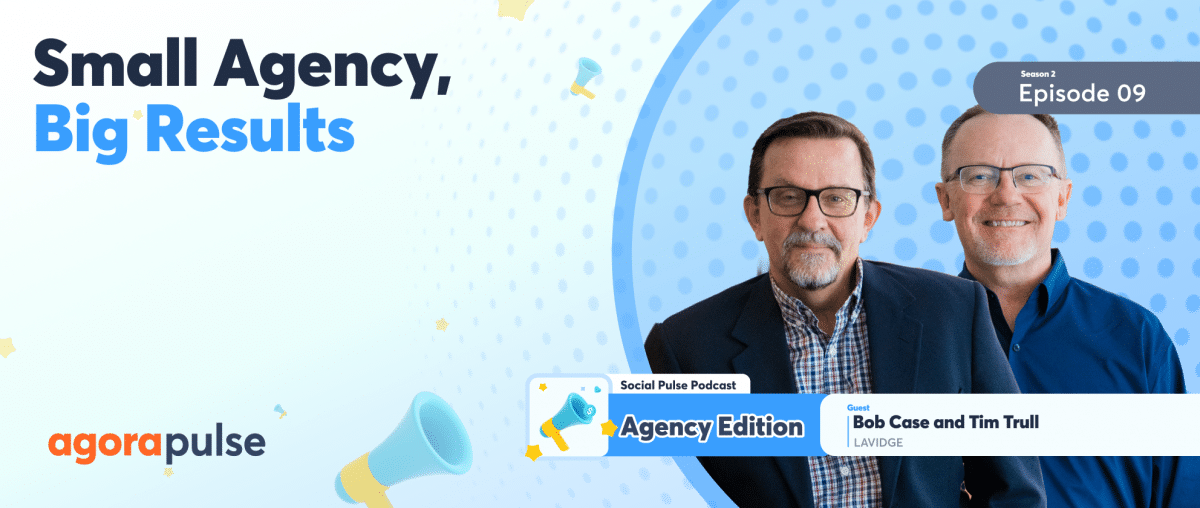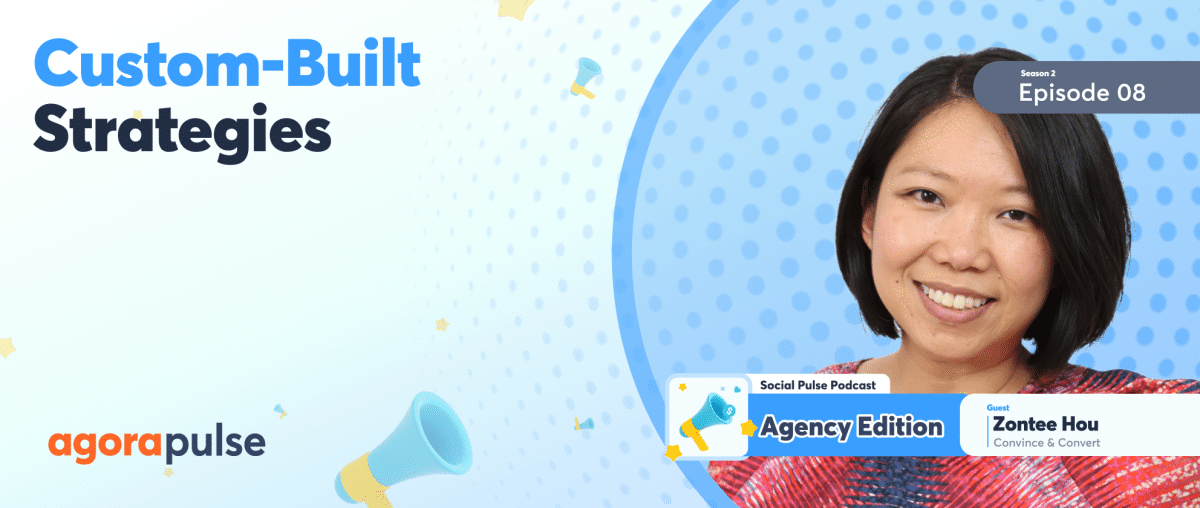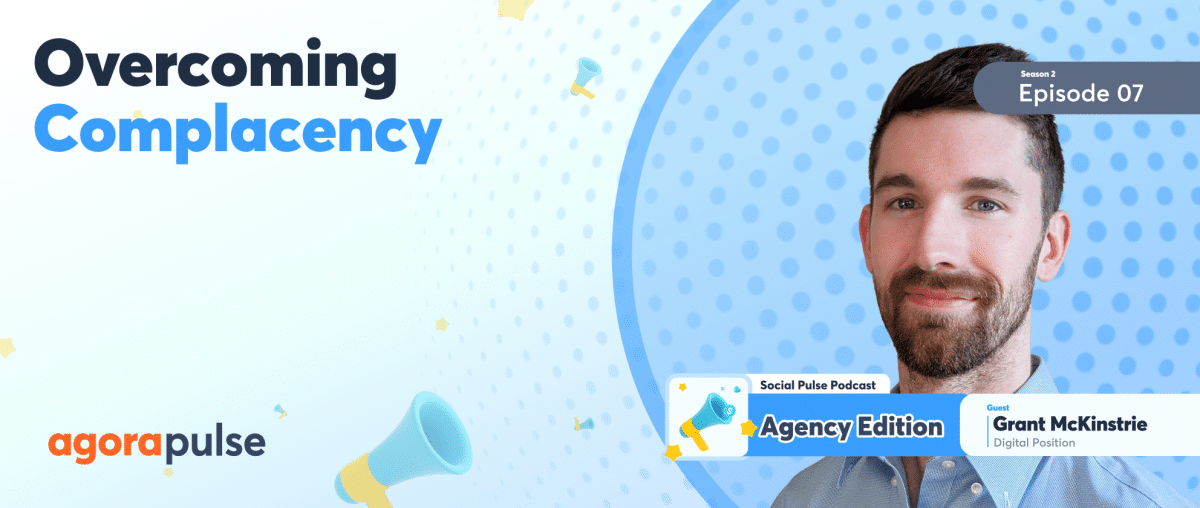Now, there are over forty five thousand digital marketing agencies in the world, not counting all the entrepreneurs who work as agencies but aren’t maybe officially registered as such in developing services, hiring staff, and differentiating ourselves in our sales and marketing to prospects. Those are all challenges. On the same lines, it can be incredibly difficult to build and grow our networks, particularly when we’re building agencies within competitive ecosystems like HubSpot or Salesforce. Now, how has the agency execute eight tackled this challenge?
Well, that’s what Christopher Barnett is here to talk to us about in episode two of Social Pulse Weekly. Christopher is the Vice President of Revenue at Aptitude 8 and brings a wealth of experience and expertise to his role, driving growth and maximizing profitability for his organization. He’s a passionate advocate for the HubSpot community, as a deeply committed person to giving back to his own community and making a positive impact on the world around him. He has first hand experience navigating the complexities of start-ups and scaling businesses, allowing him to provide invaluable insights and leadership to his team.
Listen to the entire episode below. Or read on for a summary of the conversation.
Aptitude 8
Mike: So glad to have you here, and I want you to start off by just telling us more about your role at the agency Aptitude 8. And what it is that you actually do?
Christopher: My role is VP of Revenue at Aptitude 8, and so I manage all of our strategic partnerships and revenue driving functions for the organization.
We’re an elite technical consulting partner in the HubSpot ecosystem. Ultimately, we help businesses build better on HubSpot. And that is our mantra, and we are considered one of the most technical and superior HubSpot partners in the world.
INBOUND, I’d highly suggest going to. It is one of the most educational and just overall best tech conferences that I’ve ever been to. I’ve been five years straight (this upcoming one is my sixth), and you’ll get to see all those that are drinking the HubSpot Kool Aid. It’s a great community and a fantastic ecosystem.
Mike: You’ve got that ecosystem. You’ve got this community. You’re surrounded by thousands of agencies. Why is building a network such a challenge for agencies like you and your team?
Christopher: I think we are all united around the HubSpot partnership. We realize the power of the CRM platform that can help drive and grow and scale businesses. And so we rely heavily upon the success of that partnership.
The last time I checked there is over six thousand five hundred active HubSpot partners currently. And so it’s difficult to build a network because even though we’re centered around the same thing, our goals all oppose each other. And so it is quite difficult to build a following or a network inside of this ecosystem without ruffling feathers or just building relationships that may have some sort of friction in there. It’s difficult to build the network, but ultimately it makes it more authentic when you actually do build one.
Mike: I do partnerships at Agorapulse, and so I’m completely relating to and resonating with everything you’re talking about. I’m building relationships with other brand partners. But for us, it’s different. For me, it’s different because I’m working with other brands where we have complimentary services. So it’s frankly pretty easy for us to partner up. We’re not competing.
For you, it’s different. I get that for agencies who have those competing interests. So how did you overcome that challenge.
Christopher: Yeah. I feel like it’s focused around knowledge sharing more than anything else because the beauty to having such a large and diverse ecosystem is that a lot of different partners specialize in different things. Some partners are marketing-focused. Some partners are technically-focused like us at Aptitude 8. Some partners want to do sales operations, revenue operations, things like that.
How long did it take you to start to build networks and and create those valuable relationships?
Christopher: I think it’s a constant thing of requiring the network to be a relationship.
Your network is just a compilation of all the relationships that you have. And a relationship is not one where you build it, then you’re done. A relationship is an ongoing thing that needs to be nurtured and touched.
I would say to get me to where I am today took probably five years plus. Just because, as your network grows, your relationships deepen, and it becomes harder to maintain all the relationships when you get to ten thousand followers or whatever it is. Five years of building the network at both a professional level of one-to-one networking communications, as well as partnering with other companies. We have other partnerships that we are currently nurturing, and sometimes those are more than one person.
Sometimes, it’s a whole sales team or a whole partnership team, and those are very valuable and require a lot more touch points. And so five years is what it’s taken to get my network to where it is now, and it’s been a constant maintenance of that network in order for it to pay off and be successful.
How much is all this costing?
Christopher: We talked about INBOUND, which is not cheap. So if that was the one thing that we were going to be doing this year, I’m having to put aside probably a thousand fifteen hundred bucks just for the ticket in Boston, three to four hundred bucks at night, easy, plus hotel and airfare.
Mike: What do you think your investment was total in in terms of time and money? And how would you measure or describe the results that you’ve seen as a result?
Christopher: The total cost in terms of, like, dollars is probably somewhere in the range of fifteen grand plus. Just over the many times that I’ve been to INBOUND, as well as LinkedIn Premium. If you want the software and other events that I’ve attended previously outside of conferences, they’re somewhere north of fifteen grand. As far as time input, it’s likely hundreds of hours, if not over a thousand.
As far as my return on investment from that, I exited my last company that I founded, and that paid for itself many, many, many times over. The value of the network and the revenue that I was able to drive for my business at that time was very, very quick. The relationships that I developed at INBOUND and through the HubSpot community channels resulted in me hiring some of the best experts in the HubSpot ecosystem and helped propel my business to the next level and brought me into relationships that resulted in my exit. And so those can be quantified to likely a very high dollar amount, but if anything, it gave me a career pathway, which is way more valuable than I thought it would be.
Mike: I want to ask you if you could share an example of one of those specific relationships and the impact it had while you’re thinking.
For example, I’ve also been a a frequent attendee of conferences, usually go to Social Media Marketing World. In the spring in San Diego, in 2016, I paved my own way and went to that conference for the very first time, and that’s where I met Emeric Ernoult, who introduced me to Agorapulse for the very first time. I had just been coming off a very bad relationship with Hootsuite, and he showed me Agorapulse, and I fell in love. I became an ambassador. Fast forward, a couple years later, he ended up hiring me to run the entire affiliate ambassador program in Agorapulse six years ago.
So I’ve been with the company for six years. I’ve known about it for eight. All because I went to that event.
There are all these things that can happen as resolved relationships, particularly events.
What about evens has had a profound impact on you?
Christopher: One is the value of being in-person.
We are now a remote workforce for the most part in the world of marketing agencies and just general partners in the ecosystem. Most of us are remote. And so we don’t get to see the value of in-person all that often, especially with globally attributed teams. But one relationship in particular was actually at INBOUND 2023 last year.
I met Connor Jefferson in person for the first time. And that was what led to my eventual acquisition at the end of that same year. It was nice because we knew each other in the ecosystem. We would cross paths. He understood the great work that we were doing. I understood the great work that Aptitude 8 was doing. Being able to meet in person and see that cultural alignment as two humans together made all the difference in the eventual exit ofmyself and my team and becoming part of the Aptitude 8 family.
What takeaways do you have from going through this process over the past few years, literally investing time and resources into relationships and seeing some of the fruits of those investments?
Christopher: The main thing that I would recommend, if anyone is out there trying to build a network or a following, is people love authenticity.
Meaning there’s a lot of people out there that are creating content that is ripped from other sources or is just not as organic as what it could be. I really thrived upon the authenticity of my relationships. I typically wasn’t automating my LinkedIn messages or my outreach with email and stuff like that. I was doing my discovery, my due diligence, before I was trying to connect with the person to show that I genuinely care about building a relationship. And that yielded many, many fruits along the way.
When you are actively invested in a relationship and you want to benefit the other person that you’re communicating with, it results in a “you scratch my back, I scratch yours” sort of thing. And so it was nice just because that was the thing that I learned very early on about network building.
Here’s a stat that I always bring up: Sixty percent of people don’t trust sales reps. There’s just a negative connotation with those reps. No one likes being sold to. It’s just an obvious thing. It’s why people that sell cars have such such a hard time selling stuff. When you’re authentic about what you’re proposing and the value of it, it goes a much longer way, both in building a network and selling something.
Mike: Now we’re going to switch gears for just a second, because we love talking to agencies about the actual work that they’re doing with their clients. One of the frequent topics for us is is social media. I’m always curious how agencies are measuring the business impact of social media for their clients. Because for most, it’s a super challenging thing. Everyone’s got a different way of doing it.
How are you doing social media?
Christopher: One of the things that we thrive upon just as a business, as well as our service offerings, is being able to fully attribute your revenue dollars by source. And this is where the power of platforms like Agorapulse come into play. We have that original source attribution.
Luckily, the social media team here and the marketing team in general is second to none in the ecosystem. He does a great job of designing the campaigns and the brand presence around the influencers that are employees at the organization. So people like me, Brian Byler, Connor Jeffers, even Ryan Gunn is one of the most followed people inside of the HubSpot ecosystem. The way that we measure performance is both in direct impacts on revenue, as well as just general engagement, that we have on many of our pieces of content, events, webinars, and things like that that we host. We are a pioneer in the ecosystem, and we want to continue to be that through the quality of our content that we’re offering.
What other tools are you using that we haven’t talked about that are in your agency’s tech stack?
Christopher: Besides HubSpot, there’s a couple of other things in there like Loom. Loom is one that we use for both our internal operations and some of our external operations.
Overall, the thing that I think is has been one of the most impactful things that I wasn’t using previously was a platform called Front. It’s an email platform that allows you to manage multiple inboxes, comment on threads within emails, stuff like that. And then we use Slack. Any business that is not using Slack today is not agile as they could be. Those are the main tech stack that powers a team here at Aptitude 8.
In Conclusion
Sign up now for a free trial of Agorapulse and start managing your agency’s social media right away.
![How Do You Grow Your Network When You’re One of Thousands of Agencies? [Podcast & Recap]](https://static1.agorapulse.com/blog/wp-content/uploads/sites/2/2024/03/Blog-Images-EN-Social-Pulse-Podcast-1920x1080-Pinterest.png)
![Featured image of How Do You Grow Your Network When You’re One of Thousands of Agencies? [Podcast & Recap] thousands of agencies](https://static1.agorapulse.com/blog/wp-content/uploads/sites/2/2024/03/Blog-Images-EN-Social-Pulse-Podcast-1920x1080-Header-992x420.png)



